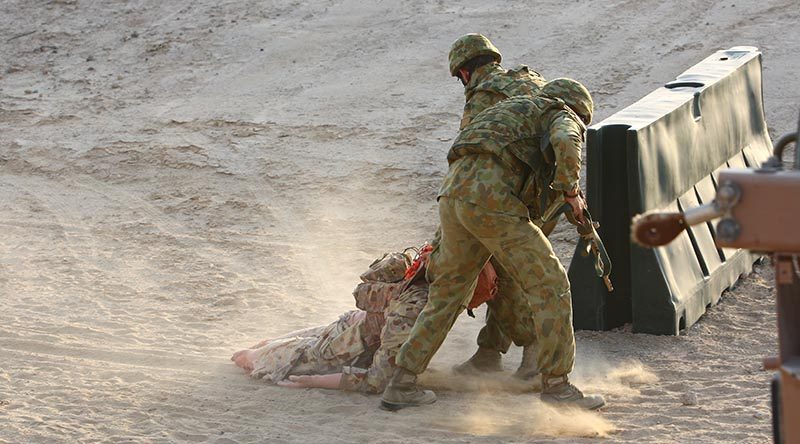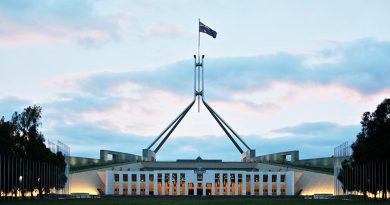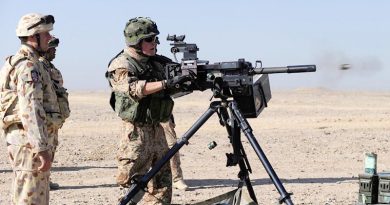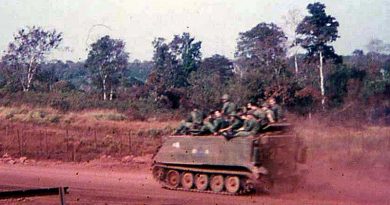Do we have a right to know when a soldiers dies on the job?
Share the post "Do we have a right to know when a soldiers dies on the job?"

Not long ago, the Department of Defence used to proactively inform the Australia public when a serious accident occurred on Defence property, usually within hours of the incident.
FILE PHOTO (2012): Australian soldiers undergoing casualty evacuation training in the Middle East. Photo by Brian Hartigan.
True these statements were usually pretty sparse on detail.
A good example is this statement from 21 November 2015…
The Department of Defence can confirm that a Defence bus carrying Australian Defence Force Academy officer cadets and midshipmen was involved in an accident this morning on Sandy Point Road, south of Goulburn, in southern New South Wales.
A number of passengers have been injured. Emergency services are responding.
Defence is in the process of notifying the families of members involved in the accident and will be providing support and assistance.
Defence will provide further information later in the day.
A further statement with more detail was provided the same day, and a third, with casualty stats was sent out the following day.
It’s worth noting that there were no fatalities in this incident.
Another good example of the ADF pro-actively keeping the Australian public informed was with the death of a soldier in Shoalwater Bay on 4 May 2017 – less than two years ago.
Again, Defence sent out* a statement, received by CONTACT at 5.45pm, that started, “It is with regret that Defence confirms the death of an Australian Army member in the Shoalwater Bay Training Area, near Rockhampton, Queensland at approximately 8:20am”.
I put an *asterisk* on ‘sent out‘, because, until relatively recently, it was Defence’s usual process to send all press releases to a comprehensive list of media email addresses, including CONTACT’s.
More recently, however, their usual process is to send only some press releases. Others, we have to go look for as part of our daily routine, or when we become aware that something is afoot.
Like yesterday, 16 January 2019, when a soldier died on exercise at Puckapunyal Military Training Area, Victoria.
CONTACT became aware of this fatality via Google alerts that civilian media organisations were reporting a death, which they said they were alerted to by either or both Victorian ambulance and/or police.
When asked by those media outlets – and four hours later, by CONTACT – Defence did confirm that a soldier had died.
This was in the form of a pre-prepared (and cleared, which takes time) statement of the usual calibre.
When CONTACT later asked Defence why they didn’t pro-actively inform the Australian public about the death of a soldier like they used to do in the not-too-distant past, their one-line response was….
“Defence is responding to enquiries on a case by case basis as per our usual processes.“
In other words, current Defence policy would seem to be – if the info leaks, we’ll react – but we’re not going to tell you about it unless you ask – and then we’ll give you a statement we prepared earlier in case you asked – but only if you ask.
And while this may be current usual process, it was not the usual process as recently as 21 months ago with the Shoalwater Bay fatality.
The Australian public absolutely does care and does want to hear about it when one of their soldiers, sailors or airmen dies in the service of their country.
The Australian public absolutely has a right to know – and the ADF does not have a right to unilaterally decide to keep us uninformed unless and until the information leaks out by some other means
…in my humble opinion.
.
.
As a footnote to this – when I asked Defence for confirmation of the fatality yesterday, I said my deadline was ‘URGENT ASAP’. Full credit – I got their response within minutes, before I had finished writing the piece.
A couple of hours later, however, Defence Media Ops asked me via email to supply them information on my publication dates and deadlines. Second-guessing my urgency?
.
.
.
.
.
.

.
.
Share the post "Do we have a right to know when a soldiers dies on the job?"






Defence does need to advise the Australian people (media) as soon as possible after an accident. I forget which year specifically, but in the late 70’s I was in 3RAR on exercise at Cultana near Port Augusta. We had a couple of Hueys operating with us. One of those choppers went into the ground shortly after refueling at the Cultana camp. Unfortunately all 4 on board died, all were RAAF. The accident happened on Defence land yet the media got the story quickly and it hit the radio stations. For several hours, all people knew, including hundreds of family members both Army and Air Force, was that several servicemen had been killed.
Every person who had a family member on that exercise feared the worst and no-one would clarify, even though Defence knew immediately who was involved. I certainly wouldn’t have expected Defence to name anyone, but at least alleviating the fears of most would have made sense.
Today, with communications being all but instantaneous and the media hungrier than ever for a “scoop”, there is greater reason for Defence to get ahead of things. We all know that when the media don’t have details, they fill in gaps with supposition.
In response to a comment on Facebook re the media’s right (or otherwise) to know, I wrote…
Defence was happy to give us the information – but only if we asked for it.
This didn’t used to be the case. Until recently they were proactive in managing the flow of information – which worked to their advantage – they could control ‘the narrative’ and the media felt they could trust Defence (up to a point).
Now they are being reactive – losing control of the story and building distrust with their audience.
This new policy of ‘only if you ask’ looks like a return to the bad old days of secrecy and obfuscation.
BTW – I absolutely agree that the family has a right to privacy and space to grieve – which is still preserved. We don’t know any details of who the man was or how he died. And we don’t need to know that level of detail. But we do need to know and trust that Defence wouldn’t seek to ‘cover up’ the death of a soldier. If they get away with that kind of thing now, they might feel they can get away with hiding the truth when ‘bad shit happens’.